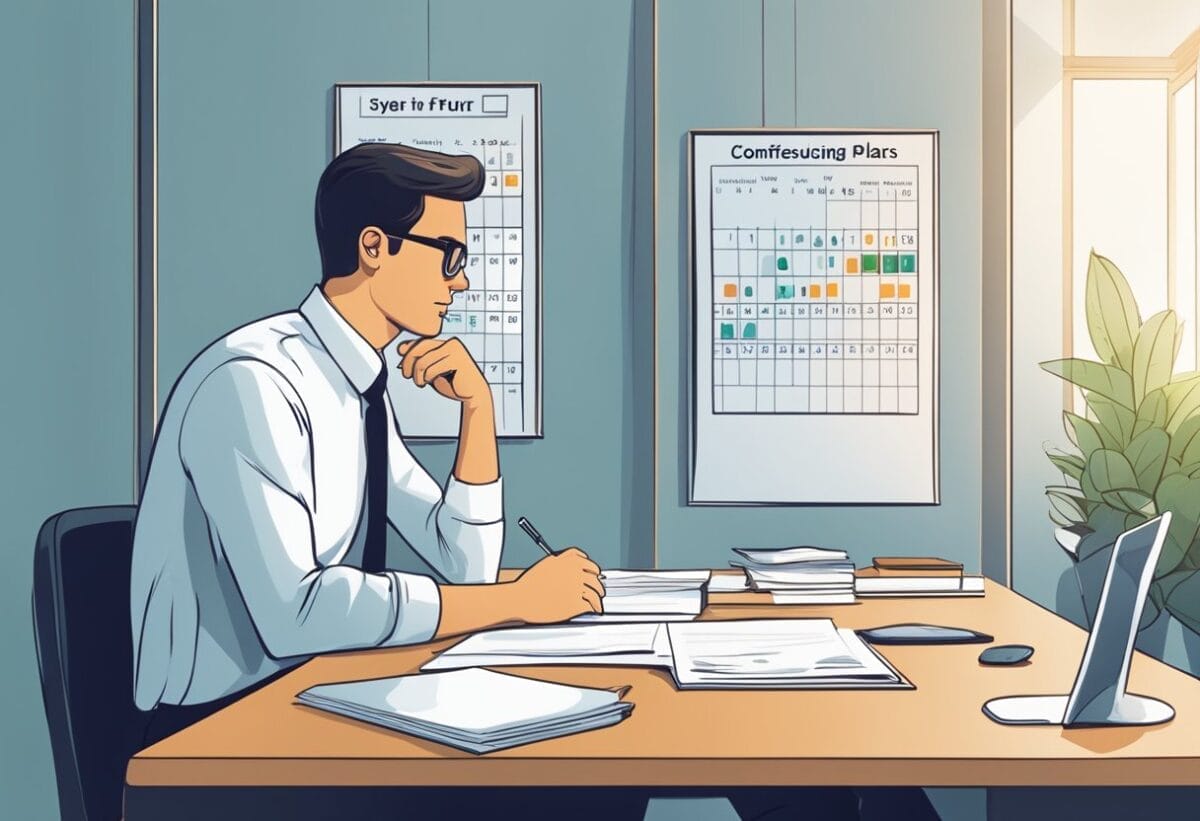“Where do you see yourself in five years?” is one of the most common job interview question that can catch many candidates off guard. It’s a common question that employers use to gauge your ambition and career goals. Your answer can make or break your chances of landing the job.
This question is not about predicting the exact future, but about demonstrating your drive and commitment to growth.
A strong response shows you’re motivated, have a clear vision for your future, and align with the company’s goals.

Preparing for this question ahead of time can help you feel more confident during the interview.
This question is a chance for you to showcase your enthusiasm for the position and your long-term potential as an employee. With the right approach, you can impress the interviewer and stand out from other candidates.
In this interview question, you want to show you’ve thought about your career path and how this role fits into it.
Key Takeaways
- Align your five-year goals with the company’s growth and values
- Show enthusiasm for learning and taking on new responsibilities
- Balance ambition with realistic expectations for career progression
Why Do Employers Ask ‘Where Do You See Yourself In Five Years?’
Employers ask this question to gauge your career goals and ambitions. They want to see if you have a clear vision for your future.
This common interview question helps hiring managers assess your:
- Long-term commitment to the role
- Motivation and drive
- Career aspirations
- Potential for growth within the company
By asking where you see yourself in five years, employers can determine if you’re a good fit for the job. They want to know if your goals align with what the company can offer.
Keep in mind that employers are looking for candidates who are:
- Ambitious but realistic
- Eager to learn and grow
- Committed to their career path
When you answer this question, you have a chance to show your enthusiasm for the role. You can demonstrate how you plan to contribute to the company’s success.
Your response gives insight into your work ethic and values. It’s an opportunity to showcase your potential and stand out from other candidates.
Preparing a thoughtful answer can help you make a positive impression during your interview. It shows you’ve given serious thought to your career and the position you’re applying for.
Common Variations Of ‘Where Do You See Yourself In Five Years?’

Interviewers often ask about your future plans in different ways. Here are some common variations:
- “What are your long-term career goals?”
- “How do you plan to grow in your career?”
- “Where would you like to be in your career five years from now?”
These questions aim to understand your ambitions and if you’re a good fit for the job. Don’t worry if the exact wording is different. The core idea is the same.
Some interviewers might get more specific:
- “What skills do you want to develop in the next few years?”
- “What position do you hope to hold in five years?”
- “How does this role fit into your career plans?”
These questions let you share your career aspirations and show how the job aligns with your goals.
While there’s no perfect answer, you should be honest about your goals and link them to the job description. Show enthusiasm for growth and learning in your field.
Your answer should prove you’ve thought about your future and are committed to your career path. This will impress your interviewer and boost your chances of landing the job.
Guide On How To Answer ‘Where Do You See Yourself In Five Years?’

Crafting a strong answer to this common interview question can set you apart from other candidates. Follow these steps to highlight your ambition and showcase your value to potential employers.
Step 1: Think About Your Goals
Think about your career goals. What do you want to achieve in the next five years? Consider your strengths and the skills you want to develop. Think about the industry knowledge you need to gain.
Make a list of your professional goals. Include certifications you want to earn or training programs you’d like to complete. This will help you create a clear vision for your future.
Remember to be realistic. Your goals should be challenging but achievable within the five-year timeframe.
Step 2: Research The Job Position
Research the company and the position you’re applying for. Look at their website, social media, and recent news articles. Try to understand their values and long-term objectives.
Think about how your career goals align with the company’s mission. Consider how you can contribute to their success while growing professionally.
This research will help you tailor your answer to show you’re a great fit for the organization.
Step 3: Be Brief About It
Prepare a brief outline of your answer. Start with your immediate goals, then move on to your medium-term plans. End with your long-term aspirations.
Include specific examples of how you plan to achieve these goals. Mention any relevant projects you’d like to work on or skills you hope to master.
Keep your answer focused on professional growth. Avoid mentioning personal goals unless they directly relate to your career path.
Step 4: Practice Saying Out Aloud
Practice your answer out loud. Time yourself to ensure you can deliver it concisely in about 1-2 minutes. Pay attention to your tone and body language.
Ask a friend or family member to listen to your response. Get their feedback on clarity and believability. Make adjustments based on their input.
The more you practice, the more natural and confident you’ll sound during the actual interview.
Step 5: Speak With Confidence
During the interview, deliver your answer with confidence. Maintain eye contact and speak clearly. Show enthusiasm for your future plans and the company’s role in them.
Be prepared for follow-up questions. The interviewer might ask how you plan to achieve specific goals or why you chose certain career paths.
Stay flexible. If the interviewer provides new information about the role or company, be ready to adapt your answer on the spot.
Remember, your response should demonstrate your ambition, commitment to professional growth, and genuine interest in the company’s success.
Best Example Answers To ‘Where Do You See Yourself In Five Years?’

Crafting a strong answer to this question shows your ambition and aligns your goals with the company. Here are some examples to help you prepare a compelling response.
Example Answer For A Recent Graduate
“In five years, I aim to be a key contributor in this role. I plan to gain expertise in our industry and take on more responsibilities. My goal is to grow with the company and possibly lead a small team.”
This answer shows your eagerness to learn and advance. It also hints at your leadership potential without being too pushy.
Always tailor your response to the specific job and company. Show how your goals align with what they offer.
Mention any relevant skills you want to develop. This proves you’ve thought about your future and are committed to growth.
Example Answer For An Experienced Candidate
Example Answer For Applying For A Leadership Position
“In five years, I envision myself leading a larger team and taking on more strategic responsibilities. I aim to drive innovation in our department and contribute to the company’s overall vision.”
This answer shows your ambition and readiness for bigger challenges. It also aligns your goals with the company’s success.
Mention specific leadership skills you want to develop. For example, “I plan to enhance my skills in change management and cross-functional collaboration.”
Show your commitment to the team’s success. You could say, “I look forward to nurturing talent and helping my team members reach their full potential.”
Example Answer For A Industry Change
“Five years from now, I see myself fully established in this new industry. I aim to combine my previous experience with new skills to bring a fresh perspective to the role.”
This answer shows your enthusiasm for the new field and your ability to adapt. It also highlights the unique value you bring.
Mention specific goals related to the new industry. For example, “I plan to become certified in [industry-specific skill] within the next two years.”
Show how your background is an asset. You might say, “I look forward to using my experience in [previous industry] to solve challenges in innovative ways.”
Example Answer For A Career Change
“In five years, I hope to have grown into a key role in this new field. I’m excited to build on the skills from my previous career while developing new expertise in [specific area].”
This answer shows your commitment to your new path and your ability to transfer skills. It also demonstrates your eagerness to learn.
Mention concrete steps you’ll take to succeed. For example, “I plan to take advanced courses in [relevant subject] to deepen my knowledge.”
Show how your unique background adds value. You could say, “I aim to use my diverse experience to bring new ideas and approaches to the team.”
Join over 11,000+ achievers who are committed to achieving their career goals!






